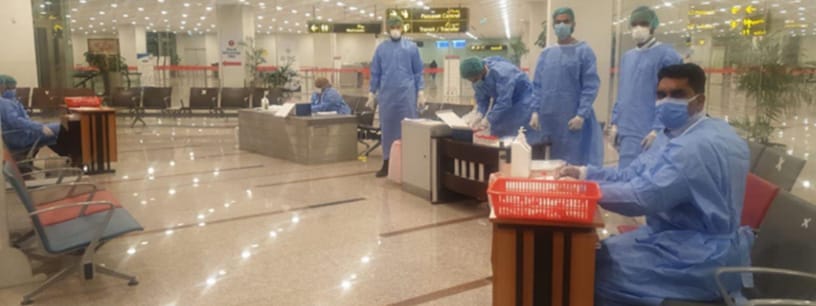CDC in Pakistan

An epidemiologist conducts HIV-related contact tracing in Pakistan. Photo by Eisha Mansoor/Pakistan Field Epidemiology and Laboratory Training Program
The Centers for Disease Control and Prevention (CDC) has engaged with partners in Pakistan for more than three decades and placed staff in-country in 2016. CDC works with several key public health institutions in Pakistan, including the National Institute of Health (NIH) and provincial and district level offices. Alongside partners, CDC works to strengthen capacity and infrastructure for key public health issues, including workforce development, hepatitis surveillance, emergency and pandemic preparedness, and polio eradication.
Global Health Security
CDC’s efforts help Pakistan increase capacities for disease surveillance, laboratory systems, workforce development, and emergency management and response. CDC partnered with the Ministry of National Health Services Regulations and Coordination and NIH to transform the NIH into a National Public Health Institute (NPHI). Pakistan’s NPHI strengthens the country’s capabilities to detect and respond to health threats and partners with other institutes to focus on research, environmental and occupational health, nutrition, non-communicable diseases, and vaccines.
The Global Laboratory Leadership Program (GLLP) began its first phase in Pakistan in 2019. GLLP strengthens the country’s laboratory leadership and management capabilities, which are key functions in public health preparedness and response. Participants in GLLP attend sessions that cover communication, leadership, laboratory systems, biosafety and biosecurity, disease surveillance, outbreak investigation, and emergency preparedness, response, and recovery.
In July 2022, GLLP participants completed their training in Lyon and began their capstone projects, which is the final step of GLLP. The first cohort of GLLP participants are on track to complete the program in mid-2023
CDC helped Pakistan complete the Joint External Evaluation (JEE) in 2023. The JEE evaluates public health capacities so that countries have a greater understanding of and can focus on closing the gaps in their national health security
Field Epidemiology and Laboratory Training Program (FELTP)
CDC has supported Pakistan’s FELTP since 2006. The Pakistan FELTP includes two tiers: the FELTP-Advanced that prepares epidemiologists for national-level leadership and the FELTP-Frontline that trains health workers as community-level epidemiologists. In December 2021, CDC officially transferred ownership of the FELTP to the Government of Pakistan. CDC’s country office continues to facilitate hands-on training for fellows in laboratory biosafety and security, laboratory management, sample transportation, surveillance of healthcare-associated infections, emergency management, and integration of existing data sources into robust systems. FELTP has been a key technical asset during several health emergencies and was instrumental in establishing Pakistan’s first hepatitis surveillance sites.
CDC-supported Pakistan FELTP fellows and graduates to respond to several epidemics and emergencies including HIV, dengue, typhoid, Crimean Congo hemorrhagic fever, cholera, polio, measles, brucellosis, salmonella, COVID-19, and country-wide floods
In 2016, Pakistan FELTP worked with provincial health departments to establish disease surveillance and response units at the local and district levels to rapidly respond to disease epidemics throughout the country
Since 2010, more than 280 fellows from 13 cohorts completed the two-year FELTP-Advanced
Since 2018, more than 290 surveillance staff have graduated from the three-month FELTP-Frontline
Polio
Pakistan is one of two countries where the spread of wild poliovirus (WPV) has never been interrupted. As a key partner in the Global Polio Eradication Initiative, CDC strengthens polio eradication strategies and immunization activities in Pakistan since 2012. CDC also partners with the Polio HUB in Amman, Jordan, which provides technical and analytic support in Pakistan and Afghanistan. In 2021, CDC’s Polio Eradication Branch established a dedicated Pakistan team. CDC funds approximately 230 contractors and consultants who assist with polio activities like surveillance, data management, rapid outbreak response, and monitoring and evaluation. CDC’s goals include:
- Optimize surveillance for acute flaccid paralysis (rapid onset of weakness or paralysis), which can be an indication of polio infection
- Increase quality of supplemental immunization activities, such as mass polio immunization campaigns
- Reduce the number of children missed during immunization campaigns
- Increase vaccine acceptance through integrated service delivery and improved collaboration between the Expanded Programme on Immunization (EPI) and the Polio Eradication Initiative (PEI)
- Improve data usage, compatibility of health information systems, and data-based risk and impact assessment for real time decision making at national, provincial, and district levels
As of April 2023, Pakistan recorded only one case of wild polio in 2023, compared to 20 recorded cases in 2022. The smaller geographic spread of WPV cases shows notable progress toward polio eradication: out of Pakistan’s 171 districts, all of the WPV cases since 2021 were reported from only four districts in the Khyber Pahktunkhwa province.
In partnership with FELTP and the Government of Pakistan, CDC established the National Stop Transmission of Polio Program (NSTOP) in 2012. Through NSTOP, CDC supports more than 80 Pakistani public health government professionals in 65 districts with high risk of polio across Islamabad and the Sindh, Khyber Pakhtunkhwa, and Balochistan provinces
CDC-supported NSTOP officers are key leaders of district EOCs as they coordinate across partners and provide technical guidance on implementation of immunization activities per the National Emergency Action Plan
NSTOP officers also serve as epidemiologists who analyze data, conduct risk assessments, and lead case investigations, outbreaks responses, and immunization campaigns outside their home districts
Through the International Federation of Red Cross and Red Crescent Societies, CDC supports more than 130 Pakistani health workers— including vaccinators and social workers— in Balochistan and Khyber Pakhtunkhwa provinces. Aside from administering vaccines, these health workers engage with communities to increase vaccine acceptance
Viral Hepatitis
Pakistan continues to experience spread of all forms of viral hepatitis. The country has one of the highest hepatitis C virus (HCV) infection rates in the world, with an estimated four to five percent of the population living with HCV. CDC has provided financial and technical support to viral hepatitis prevention and control in Pakistan for over 15 years. CDC serves on the Technical Advisory Board for the Pakistan National Committee on Hepatitis and helped implement an HCV micro-elimination project in informal urban settlements in Islamabad. CDC is also providing technical and financial support to a hepatitis B birth dose vaccination pilot program in Islamabad. CDC continues to work with local partners to identify priority activities for implementation.
As of December 2021, more than 24,000 people have been screened for hepatitis C
As of December 2021, more than 300 people were diagnosed with chronic HCV infection and treated in informal urban settlements in Islamabad
Influenza
CDC strengthens influenza surveillance in Pakistan through a cooperative agreement with the Pakistan NIH. Since 2004, five surveillance sites were established to conduct surveillance for influenza-like illness in outpatient settings and for severe acute respiratory illness among hospitalized patients. With CDC’s financial and technical collaboration, Pakistan’s NIH established a national state-of-the-art, WHO-accredited influenza diagnostic laboratory. This laboratory shares influenza virus samples with the Global Influenza Surveillance Network to inform selection of strains to include in annual vaccines.
Four of Pakistan’s five disease surveillance sites established on-site laboratory capabilities for influenza testing, which enhances rapid detection of influenza outbreaks
A CDC-supported national database was established to track both influenza and hepatitis activity
Since the COVID-19 pandemic was declared, CDC has supported Pakistan with multiple response functions, including sample analysis at the CDC-funded National Public Health Reference Laboratory in Islamabad. FETP graduates are instrumental to the country’s COVID-19 response as they lead Pakistan’s epidemiologic response, including disease surveillance among religious pilgrims from Iran and management and evaluation of COVID-19 vaccination programs.

Alumni and fellows of the CDC-supported FELTP screen incoming passengers for COVID-19 at the Karachi Airport.
In 2020, FELTP alumni and responders screened more than 1,500 international flights, which involved more than 325,000 passengers
Antimicrobial Resistance and Infection Prevention Control
CDC engages in many activities to improve healthcare infection prevention and control (IPC) and slow the spread of antimicrobial resistance (AR) in Pakistan. One AR threat of concern in Pakistan is drug-resistant species of fungus like Candida auris. CDC helps increase local capacity to detect, track, and report drug-resistant fungi like Candida auris and other organisms. CDC also supports whole-genome sequencing of multidrug-resistant organisms, which increases understanding of how healthcare-related spread of pathogens might be driving the spread of AR in Pakistani communities. CDC’s Global Antimicrobial Resistance Laboratory and Response Network, which launched in December 2021, is critical to these efforts.
CDC and partners implemented an IPC project at ten large public hospitals and trained more than 500 hospital staff to prevent the spread of infections
CDC helps increase local capacities to detect invasive candidemia, implement IPC practices at 12 sentinel hospitals, and conduct whole-genome sequencing and molecular characterization of antimicrobial-resistant Candida auris
Additional CDC Activities
In collaboration with partners, CDC helped Pakistan conduct a One Health Zoonotic Disease Prioritization workshop. This workshop brought together government ministries that represent human, animal, and environmental health to develop action plans to address zoonotic diseases of greatest concern. Priority zoonotic diseases in Pakistan include zoonotic influenza, brucellosis, salmonella, rabies, Crimean-Congo hemorrhagic fever, and anthrax.
Pakistan is the only country where extensively drug resistant typhoid fever is endemic (regularly occurring). CDC works with partners— including the local government, FETP, and Health Security Partners— to expand surveillance for typhoid and other waterborne diseases. CDC also enhances typhoid prevention and response efforts by assessing risk factors including healthcare providers’ prescription practices; vaccine hesitancy and access; and water, sanitation, and hygiene. CDC strives to strengthen data systems to inform future vaccination strategies.
CDC engages in several projects related to other bacterial diseases in Pakistan, including:
- Demonstrating the impact of Hib vaccine in preventing meningitis and pneumonia among young children in selected districts of Pakistan
- Determining the bacterial and viral causes of infections in newborns
- Supporting surveillance for the detection and characterization of agents of invasive bacterial vaccine-preventable diseases to provide data that informs decision-making on vaccinations
To increase laboratory capacities, CDC reviewed data and laboratory methods during a formal review of previously confirmed cases of typhoid
- 4 U.S. Assignees
- 2 Locally Employed
- Population: >235 million
- Per capita income: $5,800
- Life expectancy: F 69 / M 64 years
- Infant mortality rate: 52/1,000 live births
Sources: Population Reference Bureau 2022, Pakistan